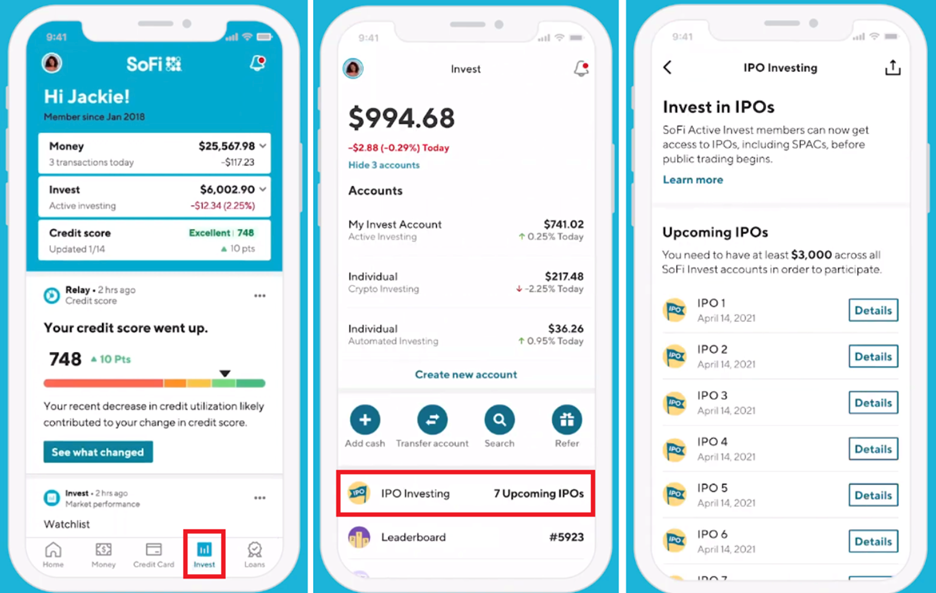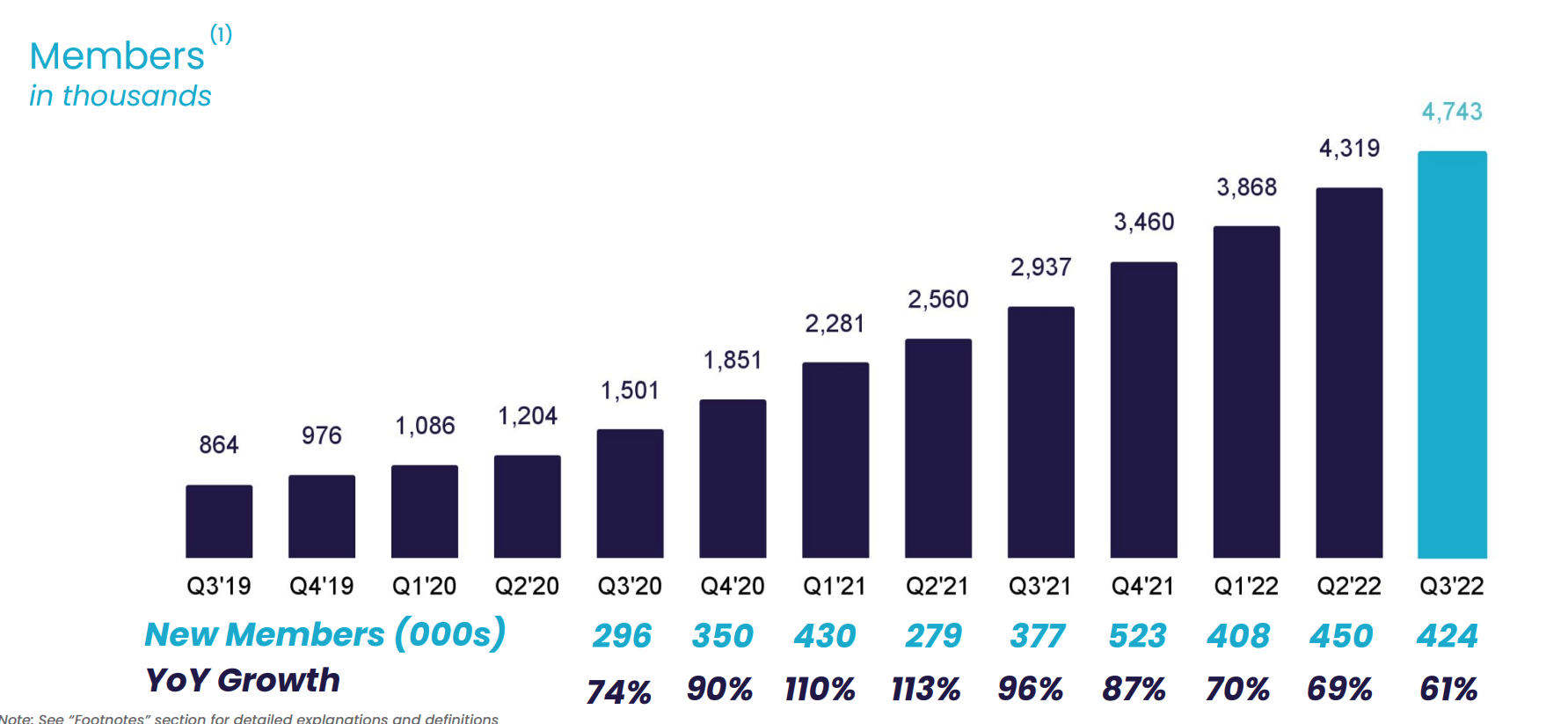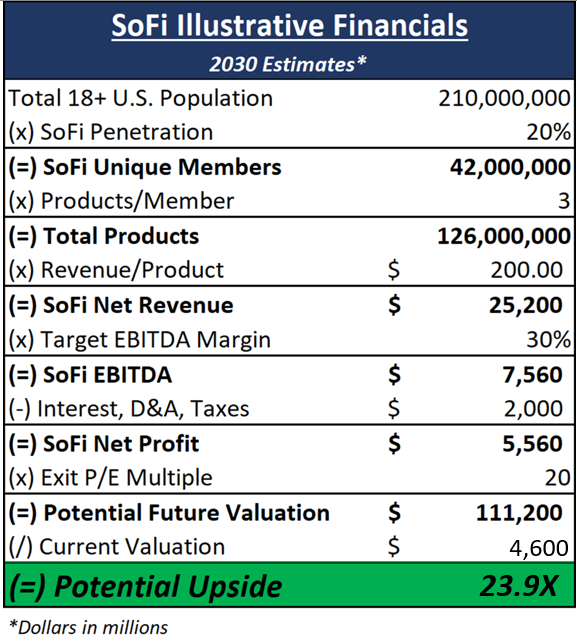Editor’s note: “Buy SoFi Stock for 24X Gains in 10 Years” was previously published in December 2022. It has since been updated to include the most relevant information available.
There’s a lot of uncertainty in the market right now. But when I look at stocks, I see some huge opportunities. That’s exactly what uncertainty creates — opportunity. After all, historically speaking, the best times to buy stocks were during periods of peak uncertainty.
This was true after the dot-com crash. It was true after the 2008 financial crisis. And it was true during the onset of the COVID-19 pandemic. Right now, it seems like another opportune moment where investors could make fortunes by simply abiding the acronym: B.T.F.D.
If I’m right, then there are dozens of 10X — or even 20X — opportunities in the market today. But none are perhaps better than SoFi (SOFI) stock.
In fact, over the next few years, SOFI stock can soar 24X from current levels!
SoFi Stock Bull Thesis
For those who are unaware, SoFi is a personal finance app that’s trying to rewrite the rules of consumer banking. Forget physical banking. SoFi’s creating a new generation of digitally native banking made for the modern consumer, all through a single “super app.” Basically, SoFi is trying to do to Bank of America (BAC) and Wells Fargo (WFC) what Amazon (AMZN) did to JCPenney and Sears.
And I think the company will do just that. SoFi is the bank of the future — the emerging “Amazon of Finance,” if you will.
Yet, SoFi stock has been absolutely crushed over the past year. And amid market selloff, the selling is picking up steam.
SoFi makes a lot of money through student loans. And the COVID-inspired pause in those payments has hurt its business recently. That moratorium was previously set to end on December 31 of this year, with repayments beginning again on January 1, 2023.
But President Biden extended the moratorium again a few months ago. And now repayments will resume by mid-2023. As a result, SOFI took a nosedive yet again.
While this is an obvious drag for the stock, it still remains a short-term headwind. And it does nothing to change the robust fundamentals underlying this company.
But as the old saying goes, it’s always darkest before the dawn. And I think it will soon be dawn for SoFi stock. It’s possible that by 2030, it’ll rise around 24X from current levels.
We believe investors who buy and hold enough SoFi stock today could turn into millionaires over the next few years.
That’s not hyperbole. That’s our honest opinion.
Here’s the complete story.
Banks Suck, but SoFi Solves the Problem
Hardly anyone likes the legacy banking process.
Think about account fees, clearinghouses, high interest rates, broken digital experiences, confusing rewards programs, long phone calls and in-person appointments. The entire process is slow, expensive and cumbersome. And that’s mostly because the industry is full of profit-taking middlemen. It’s rooted in antiquated and costly physically native processes.
So… what if technology bypassed those middlemen profiteers? What if someone created a digital bank with technology-driven processes that delivered fast, cheap, and convenient solutions to customers everywhere?
That’s what SoFi is doing.
SoFi was founded in 2011 by Stanford business school students fed up with the inefficiencies of the student loan industry. They saw a huge opportunity to fix those inadequacies, which they recognized were rooted in two things.
One — at the time, banking was a physical-first industry. And therefore, it was weighed down by property-related expenses that were inevitably passed onto the consumer.
Two — student loans were typically structured as complex transactions with tons of middlemen. And all had their own fee that the college student had to pay.
So, SoFi was created on the idea of leveraging automated technologies to create hyper-convenient access to cheap student loan refinancing.
And it worked.
Over the past decade, students across America have flocked to SoFi to refinance their loans, taking advantage of its lower rates. Those rates have been achieved using technologies to reduce the operating costs of the business. And SoFi has, of course, passed those cost-savings onto students.
That was the “hero product” that put SoFi on the map in the fintech world.
SoFi has since leveraged this success story to build an ecosystem of high-quality, low-cost, and hyper-convenient fintech solutions. And all are accessible through its single, intuitive “super app.”
The SoFi Super App

Through the SoFi app, the company offers:
- SoFi Money: a cash management account that acts like a mobile checking or savings account. It has no account fees, 1% APY and an attached debit card.
- SoFi Invest: an attached mobile investing account. In it, consumers can use their funds from SoFi Money to invest in stocks, ETFs and cryptocurrencies. They can also invest in pre-IPO shares, which are usually reserved for institutional clients.
- SoFi Credit Card: an attached credit card. Consumers can link their Money accounts to this card and earn 2% cash-back on all purchases. Those rewards can be used to pay down debt through a SoFi loan or invest in stocks/cryptos with SoFi Invest. And there’s no annual fee.
- SoFi Relay: an attached budgeting software tool. Consumers can use it to track and monitor spending via SoFi accounts and external linked bank accounts. They can also check their credit score.
- SoFi Education: complementary educational articles and videos that help consumers learn everything about finance. It covers topics from how to invest in cryptos, to what an APR is, to why credit scores matter.
With the SoFi app, you get all those things… in one application. It’s an all-in-one mobile money app that’s leveraging technology to make banking fast, cheap and easy.
It’s the future — and right now, that future is on fire sale. We believe dip-buyers in SoFi stock today will make a fortune over the next few years.
Why SoFi Will Win the Digital Finance War
To be sure, SoFi is not alone in its pursuit to reinvent the consumer finance experience. Entrepreneurs and venture capitalists have long realized that consumer banking sucks and needs to be digitized to be improved. To that end, there are lots of digital finance apps out there attempting to be the “Amazon of Finance.”
But in this digital finance war, SoFi stands superior with clear competitive advantages to sustain its leadership.
Most other apps in this space are barely breaking a few hundred thousand users (if that) with tiny revenue streams. That’s not true for SoFi.
SoFi has more than 4.7 million members on its platform. And it’s growing that number by 400,000-plus new members every single quarter (60%-plus year-over-year growth). Last quarter, revenues hit $419 million. That’s over 50% year-over-year growth, and it eclipses analyst expectations by nearly $27.5 million.
Currently, SoFi is the unrivaled leader in the digital finance war.
This won’t change anytime soon. SoFi has durable competitive advantage, which will allow it to turn into the “Amazon of Finance.”
The Team
First, there’s the team. Great people make great products. If there are great people on your team, your company will likely make great products that consumers consistently return to.
SoFi has the best team in all of finance. The CEO was CFO at Twitter (TWTR). Before that, he was the head of global banking at Goldman Sachs (GS). And that’s a position he held after being CFO of the NFL. He’s an impressive person, to say the least.
SoFi’s CFO is a former Uber (UBER) finance executive. Its CMO used to head up global corporate marketing at Intuit (INTU). SoFi’s president was formerly the president of USAA Bank. The chief risk office held the same position at Citibank (C). And the product head used to be the VP of Amazon’s Alexa shopping group.
SoFi’s employee base includes former Wells Fargo, Goldman Sachs, Citi, JPMorgan (JPM) and Bank of America bankers and analysts. Another 160-plus employees hail from Amazon, Apple (AAPL), Microsoft (MSFT), Alphabet (GOOG), Meta (META) and Netflix (NFLX).
This is the dream team. If any collection of folks can figure out how to create the “Amazon of Finance,” it’s this group.
Network Effects
Second, you have network effects. SoFi benefits from viral network effects both for in-app engagement and new-user acquisition.
In terms of in-app engagement, SoFi has successfully created a growth flywheel. Consumers join SoFi for one of its products and, over time, are attracted to and eventually adopt multiple products. This growth flywheel promotes durable average-revenue-per-user growth.
And with respect to user acquisition, SoFi is such a loved product that consumers rave about it to their friends. Through this word-of-mouth recommendation loop, SoFi has been able to grow like wildfire with minimal marketing costs. Case-in-point: I was the first to adopt SoFi in my social circle. I raved about it. Most of my friends tried it. And now it’s the most used personal finance app in my crowd.
That dynamic is playing out everywhere, every day. It creates a pathway for durable user growth.
Durable user growth combined with durable average-revenue-per-user growth, on top of a talented team that will only make this product better over time, means that SoFi realistically projects as the bank of the future.
And if that happens, SoFi stock will rattle off 24X or greater gains from current levels.
The Math to 24X Gains in SoFi Stock
By our numbers, SoFi stock has a realistic pathway 24X your money — if you buy the dip today!
The 18-and-over population in the U.S. currently measures about 210 million people. We believe about 20% of those people could be SoFi members by 2030. This would imply a SoFi member base of ~42 million people.
We think most users will employ about three products (Money, Credit Card and Invest), implying 126 million total products used. We estimate average revenue per product at that time will be about $200. Assuming so, that puts 2030 revenue at just over $25 billion.
With a competitive moat, a software-based business like this should scale toward 30% EBITDA margins. By that assumption, we believe net profits could eclipse $5.5 billion by 2030.
Based on a simple 20X price-to-earnings multiple, that implies a 2030 valuation target for SoFi of over $110 billion. That’s up around 24X from today’s $4.6 billion market cap.
The math checks out here. If SoFi does indeed turn into the “Amazon of Finance,” SoFi stock has 24X upside potential from current levels.
And per our analysis of the product and team, we think SoFi has a great chance to do just that.
So… what’re you waiting for? Buy the dip in SoFi stock today!
The Final Word on SoFi Stock
Uncertainty creates opportunity. History is clear on that.
History also shows that fortune favors the bold. And in financial markets, that means fortune favors those who capitalize on the opportunities created by uncertainty.
Right now, you have one such opportunity. The markets are going haywire. But this is not the end of the world. This, too, shall pass. And when it does, you’ll be wishing you’d bought the dip when everyone else was freaking out.
Alternatively, you could just buy the dip and make fortunes as markets rebound over the coming years.
If you want to do that, I’m going to point you in the direction of SoFi stock. It may be the best opportunity out there today.
Actually… let me take that back…
There is one other growth stock out there that offers even more upside potential at current levels. And we think it represents an even better buying opportunity.
I can’t write its name in this note. But how does this sound? Check out my free report — The Best 5 Stocks to Buy With $500. In it, I’ll tell you the name, ticker symbol and key business details of that growth stock.
Trust me. Like SoFi stock, this could make you fortunes over the next few years — if you buy the dip today.
On the date of publication, Luke Lango did not have (either directly or indirectly) any positions in the securities mentioned in this article.


